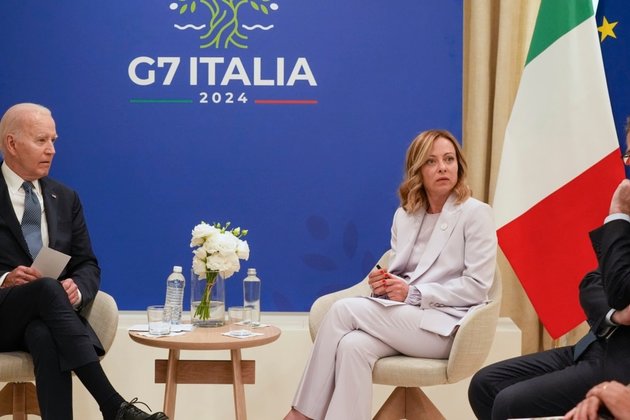Leaders of the Group of Seven wealthy democracies aim Friday to forge a united stand on economic security threats they say China poses to the global economy – including its overcapacity in electric vehicles, support for Russia’s war machine and its trade and investment practices in developing countries.
U.S. President Joe Biden is pushing his G7 counterparts to apply maximum pressure on these issues, as they meet for a second day in Borgo Egnazia, a luxury resort in Apuglia, Italy, hosted by Prime Minister Giorgia Meloni. How far the group would go will not be clear until leaders release their final communique.
China is supplying the ability and technology to produce weapons for Russia, Biden said during a joint press conference with Ukrainian President Volodymyr Zelenskyy Thursday evening.
U.S. President Joe Biden, left, and Ukraine’s President Volodymyr Zelenskyy leave after they signed a bilateral security agreement during the sidelines of the G7 summit at Savelletri, Italy, June 13, 2024.
“So, it is, in fact, helping Russia,” he said.
Beijing’s support for the Russian defense industrial base is a “critical issue” not only in terms of Moscow’s Ukraine war but in that it could “pose a long-term threat to Europe’s security,” a senior Biden administration official told reporters traveling with the president on Friday. The official spoke on condition of anonymity to discuss diplomatic matters.
Earlier this week, the U.S. announced secondary sanctions targeting those helping Moscow’s military industrial base, including China-based companies that sell semiconductors to Russia and smaller Chinese banks with business ties to Russian financial institutions that are already facing sanctions.
Beijing denounced the sanctions, accusing Washington of using the war “as an opportunity” to suppress other countries. “All of it reveals the U.S.’ calculations, hypocrisy and what a bully it is,” said Chinese foreign ministry spokesperson Lin Jian on Thursday.
Although some members are wary of the prospects of a trade war with China, the European Union on Wednesday announced higher tariffs of up to 38% on Chinese electric vehicle imports amid investigations into whether Chinese automakers are dumping government-subsidized, less expensive EVs onto European markets.
The Biden administration quadrupled tariffs on Chinese EVs to 100% earlier this year. The U.S. also imposed steep hikes on certain Chinese steel and aluminum products, solar cells, semiconductors.


Beijing vows retaliation against Biden’s hikes of tariffs on Chinese imports
In response to EU sanctions, Beijing said it “will take all measures necessary” to defend its interests but stopped short of retaliation.
Global infrastructure investments
The G7 is set to reaffirm its commitment to reform multilateral development banks, such as the World Bank, but will likely fall short of reaching an agreement on a debt relief and restructuring package for low- and middle-income countries.
The group has long sought to counter Beijing’s offering of infrastructure loans to developing nations through its massive Belt and Road initiative, estimated to total trillions of dollars, that some in the West characterize as “debt-trap diplomacy.” In response, they are aiming to stimulate $600 billion in private infrastructure funding by 2027 through their own program, the Partnership for Global Infrastructure and Investment.
G7 countries have developed their own initiatives to support PGI, such as Meloni’s Mattei Plan to bolster investments in Africa.
The U.S. has narrowed its earlier plans and is now focused on developing infrastructure corridors with key partners EU and Japan, including the Lobito Corridor that connects the Democratic Republic of Congo, Zambia and Angola, and the Luzon Corridor in the Philippines.
It’s not a “scaling down on ambitions,” another senior administration official told VOA during a briefing for reporters Thursday. “What the president wants to do is to say, let’s focus on a smaller subset of countries, but go deeper.”
The official acknowledged China is ahead in its global development game.
“We’re famous for coming in, we say a lot of nice things, we have a lot of expectations, and then we walk away. The other people come in, don’t say very much, but leave a check behind,” the official said. “The time has come to change that.”
The White House said it has mobilized more than $60 billion toward PGI investments through federal financing, grants and leveraged private sector investments over the last three years, with a goal of mobilizing $200 billion by 2027.
Pope highlights AI
G7 leaders continued their discussions on artificial intelligence and AI ethics, expanding on the principles agreed in their last summit in Japan, called the Hiroshima framework.
They will have an interesting ally to promote AI ethics in Pope Francis, who last year fell victim to AI-generated memes showing him wearing an expensive designer puffer jacket, riding a motorcycle, flying a fighter jet, DJ-ing in a night club, and in other incongruous settings.
Meloni is seeking to bolster Francis’ initiative, the Rome Call for AI Ethics. It urges governments, institutions and businesses to “create a future in which digital innovation and technological progress serve human genius and creativity and not their gradual replacement.”
Much work needs to be done, Raluca Csernatoni, a fellow at the Carnegie Endowment for International Peace Europe, told VOA.
“AI governance and regulatory landscapes across G7 members present a complex patchwork of soft and hard law approaches,” he said in an email.
“These inconsistencies and the lack of a unifying/harmonizing logic will be difficult to navigate – politically, for G7 members to achieve interoperability; internationally, for the principles to extend beyond their current scope and be adopted globally; and economically, for global business across these key markets.”
Having the pope spearhead the conversation could mean refocused attention on AI ethics, Csernatoni said, including the protection of vulnerable people and mitigating global digital divides, albeit with “a Catholic underpinning.”
The Catholic underpinning of the summit is creating division elsewhere, with diplomats saying that Italy is demanding removal of a reference to “safe and legal abortion” from the final communique from the leaders. At their Japan summit last year, it called for “access to safe and legal abortion and post-abortion care.”
The leaders are also expected to reaffirm support for the latest Gaza cease-fire proposal. Biden said Thursday he was not confident a pause in fighting will soon be achieved and that Hamas was responsible for the delay.
“I’ve laid out an approach that has been endorsed by the U.N. Security Council, by the G7, by the Israelis, and the biggest hang-up so far is Hamas refusing to sign on, even though they have submitted something similar,” he said.
Biden returns to the U.S. after wrapping up G7 sessions and bilateral meetings with Meloni and the pope and will attend Friday evening campaign events in Los Angeles.




